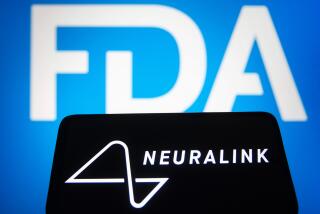Brain Bank Deposit May Pay Dividends to Fellow Humans
- Share via
MIAMI — “The brain,” says Deborah Mash, “is the last uncharted biological territory.” And she’s on the frontier, an inner space explorer.
In Mash’s freezer now are 200 brains, 500 more are pledged, and she wouldn’t mind having yours. In exchange for a promised donation, she promises not to come for your brain until you are finished using it.
In an age when donating body parts for transplant has become almost routine, relatively few people think about leaving their brains to science. “But we need them,” says Mash, director of the University of Miami medical school’s Brain Endowment Bank, which is funded by both private money and the National Institute on Aging.
By a joint proclamation of Congress, the 1990s is the decade of the brain. And Mash, along with brain bank researchers at Harvard University and UCLA, are poised for breakthroughs in understanding schizophrenia, Parkinson’s disease, Alzheimer’s disease, Tourette’s syndrome, multiple sclerosis and other neurological disorders.
By comparing healthy brain tissue with diseased tissue, scientists have made particular progress in mapping schizophrenia and Alzheimer’s, Mash said. Just last month, for example, researchers at UCLA identified a brain hormone that may be responsible for memory loss in Alzheimer’s patients.
“We’ve learned more in the last 10 years than in all history,” Mash says. “We’re using computers to model the brain, to make an atlas of it, to look at the difference between male and female, young and aged.”
But there are problems. Among them is a shortage of donors, especially those with healthy brains. The Miami brain bank receives from three to five donations a month, fewer than the number needed to meet the demand for tissue or to provide an ideal sample size.
The larger National Neurological Research Specimen Bank at the Department of Veterans Affairs Medical Center in Los Angeles (310-824-4307) collects an average of 12 brains a month. Says director Wallace Tourtellotte: “We appeal to the next of kin of those with Alzheimer’s and other diseases, but we can’t get enough. We can’t get brains through the (county) coroner’s office, either, and that is just a travesty of justice not to use these materials for scientists.”
Most people don’t think of having their brain donated after death, says Trudy L. Skoke, who arranges for post-mortem removal and transport of donor brains in Miami.
In addition, she said, “a lot of people think the brain is the seat of their soul, and when they give that up, they give up everything they were in life--but they’re dead.”
Both Skoke and Mash spend a lot of time preaching the doctrine that a brain is a terrible thing to waste.
“Without brain tissue we cannot do our job,” Mash says. “Everybody is living a lot longer, and we need to understand normal aging. Why do some people age well, stay razor sharp into the eighth and ninth decade and others do not? We need to solve the code on that quickly, because as a nation we’re faced with a growing burden of elderly folks who need care.”
Elizabeth Howland, 83, who said she watched her husband, an oral surgeon in Plantation, Fla., “die by inches” through a series of strokes, pledged her brain to the brain bank. She did so “simply in the hope that we can learn something and maybe prevent that kind of suffering in the future.”
In addition to agreeing that her brain can be removed no later than 12 hours after her death, Howland also agreed to submit to an annual battery of tests.
“Womb to tomb, we want to know everything about you,” said Mash, a professor of pharmacology whose specialty is tracing chemical pathways in the brain. “Ever live near a landfill? Ever lose consciousness from an injury? Do you smoke? How old was your mother when you were born? What illnesses have you had?”
With such a relatively small sample, comparative brain studies are skewed. Volunteer donors are usually well-educated, and have what Mash calls an altruistic instinct.
Mash, 40, already has enrolled to make a personal deposit in her brain bank. “I’m a spiritual person,” she says, “but I have no problem giving up my brain for science.”






